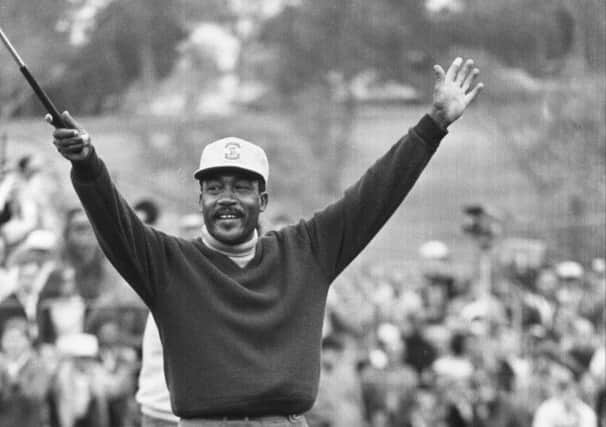Tiger Woods pays tribute to Charlie Sifford


Sifford was born on 22 June, 1922 in Charlotte, North Carolina. He worked as a caddie and dominated the all-black United Golfers Association, winning five straight national titles. He longed to play against the best players, only to run into the same barriers that Teddy Rhodes and Bill Spiller faced - the Caucasian-only clause.
Sifford successfully challenged tat clause and the PGA rescinded it in 1961. He won the Greater Hartford Open in 1967 and the Los Angeles Open in 1969. He also won the 1975 Senior PGA Championship, five years before the Champions Tour was created.
Advertisement
Hide AdAdvertisement
Hide AdDuring the 1952 Phoenix Open, one of the few events that blacks could play, Sifford found human feces in the cup when he got to the first green. He received death threats over the phone at the 1961 Greater Greensboro Open and heard racial slurs as he walked the fairways. He finished fourth, and didn’t quit.
In Sifford’s autobiography Just Let Me Play, he recalled meeting Jackie Robinson at the time Robinson was trying to break the colour barrier in major league baseball and Sifford was taking his first steps as a pro.
FOLLOW US
SCOTSMAN TABLET AND MOBILE APPS
“He asked me if I was a quitter,” Sifford said. “I told him no. He said, ‘If you’re not a quitter, there’s going to be a lot of obstacles you’re going to have to go through to be successful in what you’re trying to do.’ I made up my mind I was going to do it. I just did it. Everything worked out perfect I think.”
Golf went some way to repaying its debt to Charlie Sifford when he was inducted into the World Golf Hall of Fame in 2004, the first black player to be honoured.
Last November, President Barack Obama presented him with the Presidential Medal of Freedom. Jack Nicklaus and Arnold Palmer are the only other golfers who received that honour. “Charlie won tournaments, but more important, he broke a barrier,” Nicklaus once said. “I think what Charlie Sifford has brought to his game has been monumental.”
The one goal that eluded him was a chance to play in the Masters, which did not invite its first black player until Lee Elder in 1975. Sifford remained bitter, though the pain was eased when Tiger Woods won the first of his four green jackets in 1997.
Woods often has said he would not have played golf if not for Sifford and other black pioneers. “It’s not an exaggeration to say that without Charlie, and the other pioneers who fought to play, I may not be playing golf,” Woods said in an interview year. “My pop likely wouldn’t have picked up the sport, and maybe I wouldn’t have either.”
Woods again paid tribute last night to the man he referred to as his “honorary grandfather”. The former world No 1 said on his Twitter account: “(This is a) terrible loss for golf and me personally. My grandfather is gone and we all lost a brave, decent and honourable man. I’ll miss you Charlie.” Sifford also had an affinity with Scotland having received an honorary doctorate degree from the University of St Andrews for his career as a golfing pioneer. Sifford visited St Andrews in June 2006 to receive the doctorate and enjoyed an opportunity to play the Old Course for the first time.
Advertisement
Hide AdAdvertisement
Hide AdDr Brian Lang, Principal and Vice- Chancellor of the University of St Andrews, said at the time of his visit: “Charlie Sifford is a pioneer of the Civil Rights era whose career exemplifies courage, determination and the will to succeed in the face of substantial prejudice and adversity. He changed the landscape of sport and his story is one which should challenge and inspire us all.
“It is absolutely fitting that this man, his unique character, his dignity and his gift to golf should be honoured by St Andrews in St Andrews.”
PGA of America President Derek Sprague also called Sifford “an uncommon and faithful servant”.
“His love of golf, despite many barriers in his path, strengthened him as he became a beacon for diversity in our game,” Sprague said. “By his courage, Dr Sifford inspired others to follow their dreams. Golf was fortunate to have had this exceptional American in our midst.”